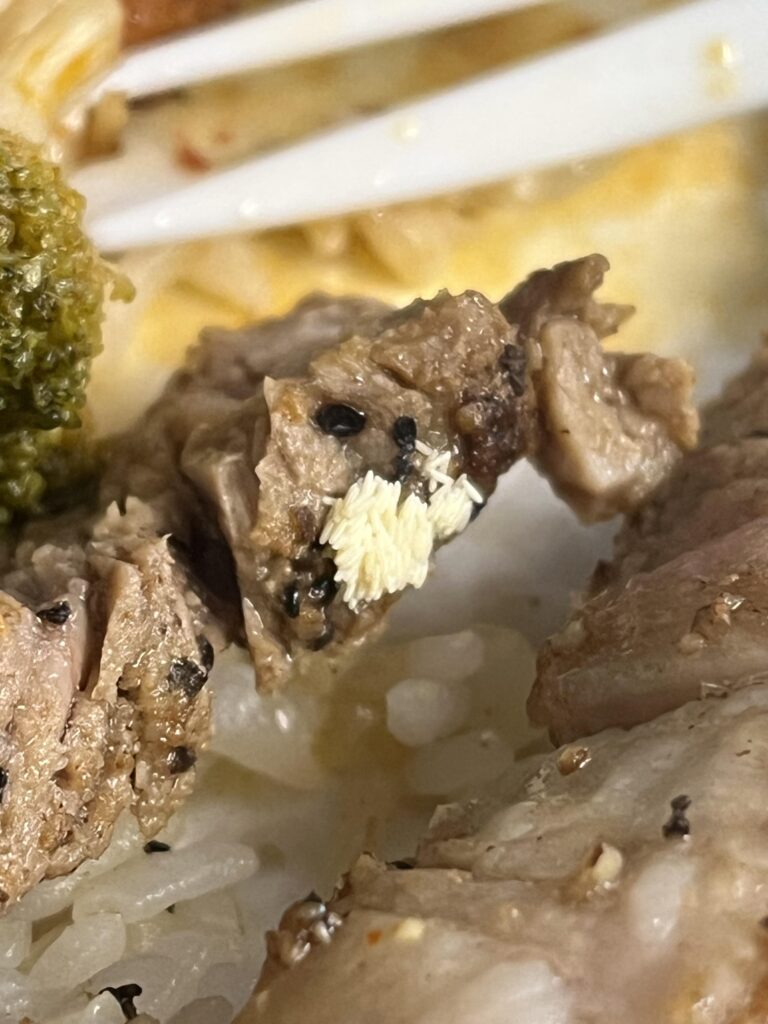The sight of tiny white specks clustered on your meat can be unsettling, to say the least. These are likely fly eggs, a common occurrence that signals potential food contamination. Flies are attracted to decaying organic matter, and meat is a prime target for their breeding grounds. Understanding the implications of fly eggs on meat and taking appropriate precautions is crucial for ensuring food safety and preventing illness.
This article will delve into the details of fly eggs on meat, exploring the signs of contamination they represent, the potential health risks associated with them, and practical steps you can take to prevent fly infestation and maintain safe food storage practices.
Fly Eggs on Meat
Fly eggs are typically small, white, and oval-shaped, often appearing in clusters or masses on surfaces like meat. They are laid by various types of flies, including houseflies, blowflies, and fruit flies, all drawn to the decaying organic matter present in spoiled meat.
The presence of fly eggs on meat is a clear indication that the meat has been exposed to unsanitary conditions and may be harboring harmful bacteria. Flies can carry pathogens on their bodies and legs, transferring them to food surfaces during feeding or egg-laying.
Identifying fly eggs on meat early is essential for preventing further contamination and potential health risks.
Signs of Contamination
Beyond the visible presence of fly eggs, several other signs indicate that your meat may be contaminated:
- Unpleasant Odor: Spoiled meat emits a foul, pungent odor that can be difficult to ignore. This smell often signals bacterial growth and decomposition.
- Slimy Texture: Contaminated meat may feel slimy or sticky to the touch due to the presence of bacteria and moisture.
- Discoloration: Changes in color, such as greenish-blue hues or a dull gray appearance, can indicate spoilage and bacterial activity.
If you notice any of these signs alongside fly eggs on meat, it’s crucial to discard the meat immediately to prevent potential illness.
Food Safety Concerns
Consuming meat contaminated with fly eggs poses several serious health risks:
- Foodborne Illnesses: Bacteria carried by flies can cause a range of foodborne illnesses, including salmonellosis, E. coli infection, and campylobacteriosis. These infections can lead to symptoms like nausea, vomiting, diarrhea, abdominal cramps, fever, and in severe cases, hospitalization or even death.
- Allergic Reactions: Some individuals may experience allergic reactions to certain bacteria found on contaminated meat.
It’s essential to prioritize food safety by discarding any meat exhibiting signs of contamination, including fly eggs.
Preventing Fly Infestation
Preventing fly infestations around your home and kitchen is crucial for maintaining a safe and hygienic environment:
- Proper Waste Disposal: Dispose of garbage regularly in sealed containers to prevent flies from breeding.
- Cleanliness: Maintain a clean kitchen by wiping down surfaces, cleaning spills promptly, and washing dishes regularly.
- Screen Windows and Doors: Install screens on windows and doors to prevent flies from entering your home.
Proper Food Storage
Storing meat properly is essential for preventing contamination:
- Refrigeration: Store raw meat in the refrigerator at 40°F (4°C) or below.
- Sealed Containers: Keep raw meat in sealed containers or wrap it tightly in plastic wrap to prevent cross-contamination with other foods.
- Separate Raw and Cooked Foods: Store raw meat separately from cooked foods in the refrigerator.
Conclusion
The presence of fly eggs on meat is a clear warning sign of potential food contamination. Understanding the risks associated with fly eggs on meat, recognizing the signs of contamination, and implementing preventive measures are crucial for ensuring food safety and protecting your health. By practicing proper food storage techniques, maintaining a clean kitchen environment, and promptly discarding contaminated meat, you can minimize the risk of fly infestation and enjoy safe and healthy meals.



